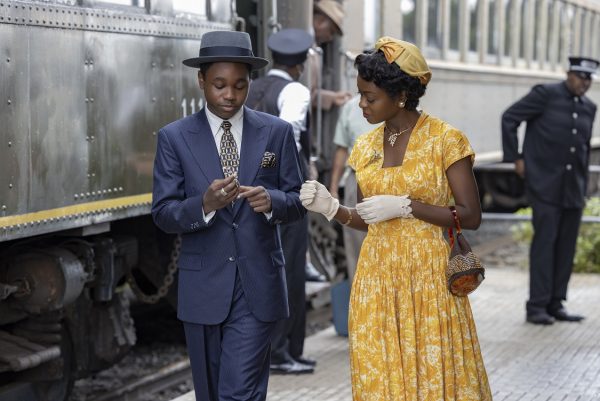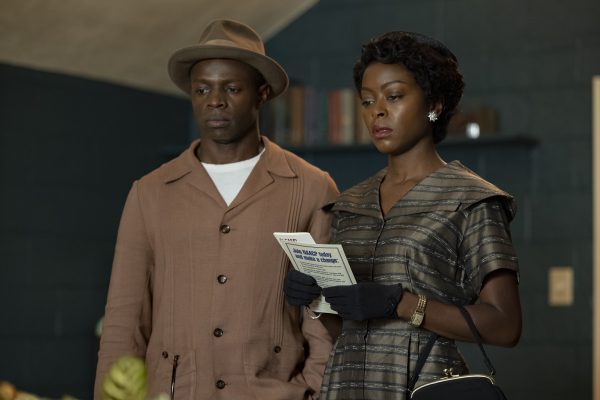‘Till’ transforms tragedy into change

“Till” (2022). Cast: Danielle Deadwyler, Jalyn Hall, Whoopi Goldberg, Sean Patrick Thomas, Frankie Faison, Haley Bennett, Tosin Cole, Jayme Lawson, John Douglas Thompson, Kevin Carroll, Keith Arthur Bolden, Roger Guenveur Smith, Marc Collins, Diallo Thompson, Tyrik Johnson, Sean Michael Weber, Eric Whitten, Darian Rolle, E. Roger Mitchell, Brendan Patrick Connor, Tim Ware, Carol J. Mckenith, Keisha Tillis. Director: Chinonye Chukwu. Screenplay: Michael Reilly, Keith Beauchamp and Chinonye Chukwu. Web site. Trailer.
Given the stark regional differences in the treatment of Blacks at the time, Till’s mother, Mamie (Danielle Deadwyler), sternly cautioned her son about how to behave in Mississippi, especially in any dealings he might have with local White residents. She strongly encouraged him to “be small,” showing the accepted level of deference expected from Blacks living in a staunchly segregated society, where laws sanctioned and protected such pervasive separation. Having been born in the South herself, Mamie knew what the conditions were like, and she desperately tried to impress upon Emmett that life there was far different from what he was accustomed to. He repeatedly said that he understood, but Mamie had her doubts and never hesitated to reiterate her cautions before he departed.

Upon his arrival in Mississippi, as Till began to discover firsthand the impact of the cultural differences Mamie described, he found himself in an environment more restricted than he had anticipated. He toned down his openly easygoing ways to a certain extent, but he also bragged freely to his cousins and other family members about the freedoms he enjoyed in Chicago that were noticeably absent down South. And, unfortunately, that attitude would end up proving problematic.
While visiting a local grocer with his relatives one afternoon, Till made a purchase from the store’s White clerk, Carolyn Bryant (Haley Bennett), wife of the shop’s owner. He attempted to engage in a conversation with her, even paying her what he thought of as a compliment, a gesture she found highly offensive and wholly inappropriate coming from a young Black man. The incident quickly escalated, becoming decidedly intense and ending with Till whistling at Bryant, who saw his action as an insult that forced him and his cousins to hurriedly flee to safety.
Over the next several days, Emmett’s cousins feared for their relation based on what happened. However, with no immediate retaliation taken against him, Till felt secure that he was safe. That proved to be false comfort, though, when Bryant’s husband, Roy (Sean Michael Weber), and his half-brother, J.W. Milam (Eric Whitten), showed up at the family’s home in the middle of the night. They abducted Till, taking him away to be lynched. Emmett was mercilessly beaten and shot in the head, with his body dumped in the nearby Tallahatchie River. When his corpse surfaced three days later, it had become bloated and disfigured beyond recognition.
When Mamie received word of what happened, it was her worst fear realized. She was devastated. And, while she received comfort and support from her fiancé, Gene Mobley (Sean Patrick Thomas), and her parents, Alma (Whoopi Goldberg) and John (Frankie Faison), Mamie was almost beyond consolation. However, despite such unimaginable despair, Mamie would not allow herself to retreat into her sorrow. She vowed to fight back, speak up and make the tragedy of her son’s murder known.

To begin with, Mamie insisted on an open casket funeral for Emmett. She wanted the world to see what the lynch mob had done to her son. Others tried to dissuade her, claiming that Emmett’s disfigured appearance would be far too grotesque and shocking, more than the public could bear. But Mamie said that a long-sleeping public had to witness the horrific treatment inflicted on Emmett and to be made aware of the atrocities that Blacks were routinely being subjected to. And, even though the wake and funeral were exceedingly painful for those who attended to pay their respects, they also praised Mamie for her decision because they knew it would change the minds of many. And, on top of that, an even wider audience was reached through the publication of photos of Emmett’s corpse in such outlets as The Chicago Defender newspaper and Jet magazine.
As tragic as this incident was, it marked a seminal moment in the emergence of the civil rights movement. It may have seemed somewhat unlikely that a loving and grieving mother could have assumed such an integral activist role, but Mamie could not let this situation pass unaddressed, trying though it may have been. She epitomized the notion of a pillar of strength at a difficult time, and she and her cause became even more empowered when infused with the backing of other outraged and committed civil rights activists like Medgar Evers (Tosin Cole), William Huff (Keith Arthur Bolden) and Rayfield Mooty (Kevin Carroll).
This support was particularly valuable when Bryant and Milam went to trial. Under the auspices of Judge Curtis Swango (Tim Ware) and tried by an all-White, all-male jury, the case skirted the core issues of the incident, with the defense raising all kinds of ancillary matters to deflect attention away from the perpetrators. The court also gave blanket credence to the testimony of Carolyn Bryant, whose account of the incident differed markedly from the depiction of what happened in the grocery store. Such tactics undoubtedly had to have been difficult for Mamie to endure, given that she was determined to testify in court that she could definitively identify the allegedly unrecognizable corpse as that of her son, one of the arguments widely touted by the defense team to rebut the charges against their clients.
In the end, Mamie and her supporters underwent tremendous heartache on so many fronts as this tragic story played out. But, despite whatever injustices may have been perpetrated at the time, one could argue that the long-term impact to emerge from this incident has indeed defied the axiom that “justice delayed is justice denied.” To be sure, justice may have truly been long delayed, but it eventually surfaced, first through the rise of the civil rights movement and later with the enactment of the Emmett Till Antilynching Act, which was signed into law in March 2022. It may have taken 67 years to see this outcome appear, but we can only hope that its eventual materialization has helped Emmett, Mamie and others rest a little more soundly.

While Mamie was undeniably devastated by this tragedy, she believed that she could make something good come from it, something that proved to be both a fitting tribute to her son and an enduring benefit to society. And those beliefs were the key to the unfolding of these developments for they carried the power to bring them into being. This is the key principle underlying the conscious creation process, the philosophy that maintains we draw upon these intangible resources to manifest the existence we experience. Mamie may not have heard of this school of thought, but she was certainly adept at knowing how to get things done – and believing that the anticipated outcomes to emerge from those efforts were indeed attainable.
For instance, when Mamie saw Emmett’s mangled body, she knew that the sight of it would shock others as much as it did her. If that image weren’t revealed to the world, the impact of exposing it and what happened to her son would be lost. And, if changing the minds of the public was truly essential to help bring about changes in society, then this was a step that had to be taken, no matter how potentially gruesome and upsetting it might be.
Mamie knew all this but believed it was necessary. It had to have been a difficult decision to make, given that this was the sort of event that ordinarily would have been handled tactfully and discreetly. It was also a decision for which she risked considerable ridicule; openly displaying Emmett’s battered corpse might have easily been seen as inappropriate and possibly even exploitative. But, again, she knew that few acts would have as much influence as this one did.

The same was true when it came to Mamie’s decision to testify at the trial of Emmett’s killers. Many believed that it wasn’t necessary to put herself through such pain and anguish, particularly in a court and locale where she would be openly subjected to blatant hostility. But she believed that, if there were any chance at obtaining justice for Emmett, she would have to do so, no matter how difficult that might be. Letting the defense team freely get away with spreading doubt about the legitimacy of Emmett’s corpse as a means to help let Bryant and Milam off the hook was patently unacceptable to Mamie, and she believed she had to do all she could to keep that from happening, regardless of the personal cost to her. And, even if she didn’t succeed in this effort, at least her testimony in open court would be established and on the record for the world to see.
Some may question how much genuine influence Mamie’s actions had on changing the course of race relations and the civil rights movement. And, admittedly, that may be something that’s hard to legitimately quantify. However, think of where matters might stand had it not been for the actions she took. Would we still be fighting for the gains we’ve made since that time if she had not undertaken those boldly courageous, personally painful measures? She believed change was indeed possible, even if progress is difficult and agonizing to achieve. But at least change was ultimately capable of being achieved. Circumstances today still may not yet be perfect, but they’re a far cry from what they once were, and there’s much to be said for that.

It’s important to recognize that all of this came about because Mamie had faith in her convictions. That unshakable confidence in her beliefs and her stalwart adherence to them about what was not only imaginable but indeed truly possible carried her through those dark times. She set an inspiring example for those involved in the civil rights cause, as well as for anyone who holds a heartfelt commitment to the fulfillment of a particular objective. But that shouldn’t come as a surprise to any endeavor backed by a mother’s love, something Mamie had in boundless measure when it came to her son. Together they made for quite a duo, both in life and in death and in what they were ultimately able to achieve for the benefit of the rest of us.
Rarely does a film come along that captures and fuses feelings of outrage and heartache as effectively as “Till” does. Writer-director Chinonye Chukwu’s third feature outing breaks things wide open in her compelling take on the tragedy of this African-American teenager all those years ago. This fact-based offering vividly depicts the brutality and injustice of what happened (faint of heart viewers be warned) while simultaneously chronicling the efforts of Till’s courageous mother to protect and champion the civil rights of minorities. The picture illustrates how a fiercely loving and devoted mother forced a complacent public to see what was really happening – and creating a grass roots groundswell for change in the process. The film gets just about everything right (save for a musical score that doesn’t quite seem to align with the subject matter), including in the superb period piece production values, writing that fittingly captures the mood and themes of this story, and, most notably, the performances, particularly those of Oscar contender Danielle Deadwyler, Jalyn Hall, Whoopi Goldberg and other cast members. This is a truly important film, one that genuinely lives up to all of its billing and as one of the best offerings of 2022. Look for it to be a strong candidate come awards season. The picture is currently playing theatrically. By all means, please see it.
Sadly, there’s no reversing what happened to Emmett Till. This barbaric atrocity, unfortunately, will always be etched in the nation’s history and consciousness. The heartache will indeed forever be there. But there’s nothing to stop us from working to bring about change as a result of such appalling incidents. Transforming tragedy into meaningful reform is possible, provided we believe in and work toward its manifestation. It’s by no means an acceptable substitute for what occurred, but it may help to ease the pain – and to help prevent such events from happening again.
Copyright © 2022, by Brent Marchant. All rights reserved.



